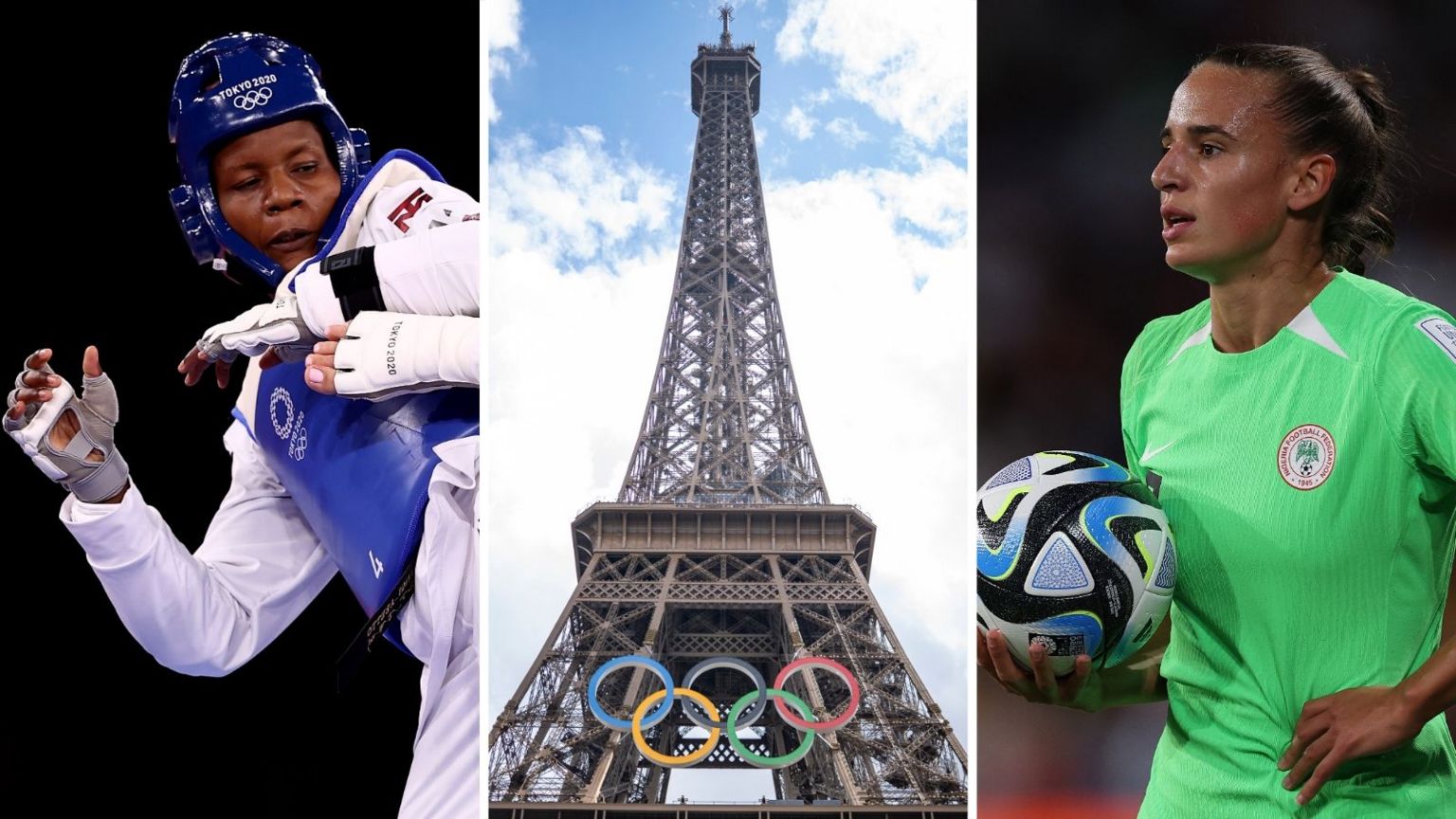How does it feel to miss out on the Olympics?

Kenya’s Faith Ogallo (left) and Nigeria’s Ashleigh Plumptre (right) have had to come to terms with missing out on this year’s Olympic Games
-
Published
Competing at the Olympics is often viewed as the highlight of an athlete’s career – so for those who fail to qualify the action can be hard to watch.
The feeling can even worse for sportsmen and women who miss out on a place at the Games through no fault of their own.
Footballer Ashleigh Plumptre, who would have been expected to start for Nigeria at Paris 2024, cheered on her team-mates from a rehab centre on Thursday as the Super Falcons opened their group campaign against Brazil.
The 26-year-old defender is absent from what would have been her debut Olympics because of a heel problem.
“A lot of emotion came out of me when I knew I wasn’t going,” Plumptre told BBC Sport Africa from Qatar.
“The squad is so small and they can’t be taking somebody who’s only 60% or 50% (fit).”
The former Leicester City player had surgery on a long-standing Achilles tendon problem in April, missing Nigeria’s final Olympic qualifiers against South Africa.
“Initially, my thought was ‘If I do it now I might be able to get back,” the centre-back explained.
“My aim was still to get back for the Olympics even though the doctor said ‘You won’t make it’. I was like ‘I don’t care. I’ll do everything every day to try and get there’.”
-
-
Published2 days ago
-
-
-
Published13 hours ago
-
Missing out has made Plumptre, who plays club football for Al-Ittihad in Saudi Arabia, question her choice on the timing of her operation.
“I think ‘What if I got the surgery earlier?’,” she added.
“I could have got there. I have this disappointment but it’s paralleled with acceptance.”
Plumptre first dreamed of going to the Olympics as a 10-year-old.
“I always wanted to be a team doctor for an Olympic team because I never thought I could be playing professional football.
“I wanted to go to medical school because the only two things that I used to think about when I was younger was helping people and human anatomy.”
Nigeria’s women are appearing at the Games for the first time since 2008, yet Plumptre is still holding on to her dream, hoping to reach the Los Angeles Olympics in 2028.
“I know how amazing that would feel if in four years’ time I could make the next one,” she said.
“It would mean way more, for sure.”
‘Your heart starts beating and you can’t breathe’
Meanwhile, there are athletes whose high hopes have been shattered by basic administration, rendering years of gruelling preparation for Paris 2024 meaningless.
The current state of boxing in South Africa means John Paul Masamba is considering calling time on his amateur career after a “heart-breaking” setback in his attempt to take to the Olympic ring.
“For now, boxing is kind of in the drain,” Masamba, a bronze medallist at this year’s African Games in Accra, told BBC Sport Africa.
“I’m trying to stay positive. It is a healing process.
“I might try something new or just go pro. But at the same time I might take a break.”
South Africa is the continent’s most successful Olympic boxing nation, with six golds from a total of 19 medals.
However, the country’s boxers have not appeared at the Games since London 2012.
They did not feature in qualifiers for Tokyo 2020 after the South African National Boxing Organisation (Sanabo) failed to raise funds to compete. Those officials subsequently left office and were replaced with a new team.
Ayabonga Sonjica was one of two boxers South Africa sent to London 2012, and the bantamweight was beaten in the round of 32
Yet this year Sanabo officials told SABC News that South Africans would not compete in qualifiers for Paris 2024 because the three years from the delayed Tokyo Games was not enough time to get boxers ready.
“When I heard we were not going… your heart starts beating and you can’t breathe,” Masamba recalled.
“I started stress eating, buying different types of food thinking ‘I’m done with this’.”
Aged 24, Musamba could still work towards 2028 but, with boxing not assured of a spot at the Los Angeles Games, his career is at a crossroads.
Boxing has been integral to the lightweight’s life.
His forearms have two massive tattoos, with the words ‘hard’ and ‘times’ on either arm, paying homage to a sport which provided an outlet during a difficult youth.
“From helping my brothers and myself stop being bullied, to me changing my mindset, boxing has helped me a lot,” Masamba said.
“Even though I got diagnosed with depression and anxiety. It helps being disciplined, motivated, focused and knowing what I want.”
Finding a purpose
Faith Ogallo won a silver medal in her weight category at the 2019 African Games
Kenyan taekwondo star Faith Ogallo was “crushed” after being reduced to being a spectator at African taekwondo qualifying in February when she missed her weigh-in.
The 30-year-old, a self-funded athlete who depends on her family for support during Olympic cycles, was hoping to book her second appearance at the Games.
Ogallo claimed she was ultimately disqualified from the event in Senegal because of a delay by Kenya Taekwondo Federation (KTF) in paying her registration fee.
“It took me time to accept the reality,” she told BBC Sport Africa.
“It was only my family members who are able to counsel me. I was so down.
“Then, slowly, they motivated me from there. I got back on track.”
KTF told BBC Sport Africa that the registration fee had been paid on time but that Ogallo failed to weigh in on time because of a lack of an accreditation card – which was her responsibility.
“It wasn’t the federation’s error,” a statement said. “The events that unfolded [were] not caused by team officials.”
Ogallo says KTF has now promised to ensure she gets sponsorship for 2028, but her failure to compete in Paris has left her jaded.
She is taking time out to focus on other passions, including climate activism.
“I had to get back quickly to championing climate change actions, to continue doing my things,” Ogallo said.
“I also had to go back to school, to do a course in healthcare and have more skills on social work.
“Besides training, I’m doing extra things in the society. I have to mentor, I have to empower.”






